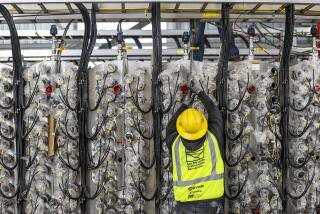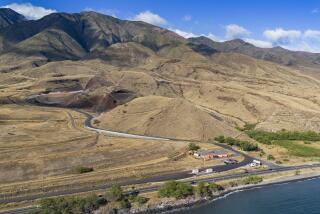EPA May Change Dump Site Status, Clear Way for Sale
MONTEREY PARK â The U.S. Environmental Protection Agency, which is cleaning up the closed Operating Industries dump, says that 45 of the 180 acres could be taken off the Superfund list if studies to be completed by the end of this year show there is little contamination.
That could clear the way for a $60-million commercial project.
The 45-acre parcel, separated from the remaining 135 acres of the dump by the Pomona Freeway, was put on the Superfund cleanup list in May over the objections of Monterey Park and state health officials.
The city and state wanted to sell the 45 acres for the commercial project, arguing that the property had only minor contamination that could be cleaned up by a developer.
But the EPA refused, citing the presence of methane gas, lead and cancer-causing chemicals, plus uncertainty about what else might be on the property.
Keith Takata, regional EPA chief of Superfund programs, told the City Council last week that by the end of this year the agency will have enough information to determine whether an extensive cleanup effort will be necessary on the 45 acres.
âIf it shows no problem, we could take that portion (of the dump) off the (Superfund) list,â he said.
Takata said that the EPA has never objected to the sale of the property or tried to block development of it.
He said the Superfund list âis not a blacklist to say you canât build there.â In fact, he said, the property could be cleaned up and developed at the same time.
But Mayor G. Monty Manibog said that no one will buy and develop the property while it is on a toxic clean-up list because of possible liability.
Commercial Proposal
Transpacific Development Co. of Torrance has proposed a commercial center, including offices, retail stores and auto dealerships, for the property. The company set the plan aside after failing earlier this year to persuade the EPA to drop the Superfund listing.
Richard Plummer, marketing director, said Thursday that the company is still interested in acquiring and developing the property âprovided the agencies determine that the site is clean of toxic waste.â
Manibog said the proposed commercial project is vital to the city because it would create 3,000 jobs and produce $1 million a year in city tax revenue.
In addition, he said, sale of the property would channel up to $7 million into a trust fund to clean up the dump.
However, Councilman Chris Houseman said that the council is not so hungry for development that it will override health and safety considerations.
âThe city has a number of revenue problems, but we view those as secondary to the health and safety of residents,â he said.
Outlining Steps
Officials from the EPA and eight other state, regional and county agencies with jurisdiction over the dump met with the council last week to outline what steps they are taking.
The dump, established in the 1940s, occupied 190 acres originally, but was divided by construction of the Pomona Freeway in the 1960s.
The EPA says that only clean fill dirt was put in the 45 acres north of the freeway after 1975. Most of that property is now occupied by an auto salvage yard and a nursery.
The portion of the dump south of the freeway accepted hazardous materials, including liquids, paint sludge, residues from industrial tanks and oily wastes, as well as ordinary household refuse before closing nearly two years ago.
Environmental Concerns
Julie K. Anderson, EPA project director, said that although comparatively little is known about the northern 45 acres, there are a host of environmental problems connected with the dump south of the freeway.
She said ground water under the dump is contaminated with metals and organic chemicals, landfill gas has leaked out of the site, and gases are escaping through cracks in the dump soil, producing odors.
She said the EPA is taking steps to control hazards but must define the extent of the problem before developing a complete cleanup plan.
Takata said that it usually takes two years to investigate and plan and five years to clean up a toxic site, and that he has no reason to believe the Operating Industries project will move any faster.
Officials from the EPA and other agencies said they are taking these steps at the dump:
- Monitoring wells are being drilled to determine the extent of ground water contamination. Anderson said that the contamination has not reached producing water wells, which are about a mile away, but contaminants have been found in water under the dump.
- The system for collecting leachate--any liquid that has passed through waste--will be improved. The state has spent $500,000 so far collecting leachate and hauling it to a treatment plant in Vernon. The EPA will announce before the end of the year whether it believes a treatment plant should be installed at the site.
The amount of leachate being collected has dropped to 4,000 gallons a week from 30,000 gallons a week a few years ago, but Anderson said it is not clear whether this reflects deficiencies in the collection system or success in cleanup efforts.
- More monitoring probes will be installed to track the movement of gas. Anderson said high levels of methane and vinyl chloride, a carcinogen, were found in a Montebello home next to the dump late last year, but steps were taken to stop gas from leaking in that area. (Although the dump is in Monterey Park, it is bordered on the south, west and east by Montebello and the nearest homes lie in that city).
Since last yearâs discovery, Anderson said, periodic monitoring has found no evidence of gas leaking into homes. High levels of methane have been found in water-meter boxes in Montebello near the dump, however, she said, and vented meter box covers are being installed to prevent gas accumulation.
- Construction will begin next week on a 15-foot-high wall to buttress a slope along Ashiya Avenue in Montebello. A slope on the north side of the dump along the freeway also will be repaired.
- The system to collect gas under the landfill and burn it will be improved. Although officials with the South Coast Air Quality Management District said that the number of complaints about odors has fallen to 40 during the first seven months of this year, compared to 145 during the same period last year, officials said they are not satisfied with the gas collection system.
- AQMD officials said they will decide within a few weeks whether to issue a permit to GSF Energy Inc. for a plant to draw gas out of the landfill and use it as a fuel to create electrical energy. GSF formerly collected gas to process it for sale to Southern California Gas Co., but has closed that operation. While seeking permits for its new plant, GSF is getting rid of the gas it collects by burning it.
- AQMD is considering a permit to allow an oil company to dig up hundreds of cubic yards of trash and dirt to find an oil well that it abandoned at the dump in the 1950s. The company failed to seal the well properly, and it acts as a conduit carrying leachate to ground water.
Takata said it is not clear how much will be spent on the cleanup effort at Operating Industries, but âweâre talking many millions of dollars.â
The EPA took over cleanup of the site in May after Operating Industries reported that it no longer had funds to pay for the work that regulatory agencies had ordered.
Lisa Trankley, deputy attorney general, said that the state and the AQMD have been successful in obtaining court orders that tie up the assets of Operating Industries and channel proceeds from the sale of its properties into trust funds for site cleanup.
So far, she said, $2.8 million has been collected.
Eventually, state and federal officials said, the regulatory agencies could seek cleanup costs not only from Operating Industries but also from the companies that generated the waste that has caused environmental problems and the trucking companies that hauled it to the dump.
More to Read
Sign up for Essential California
The most important California stories and recommendations in your inbox every morning.
You may occasionally receive promotional content from the Los Angeles Times.










